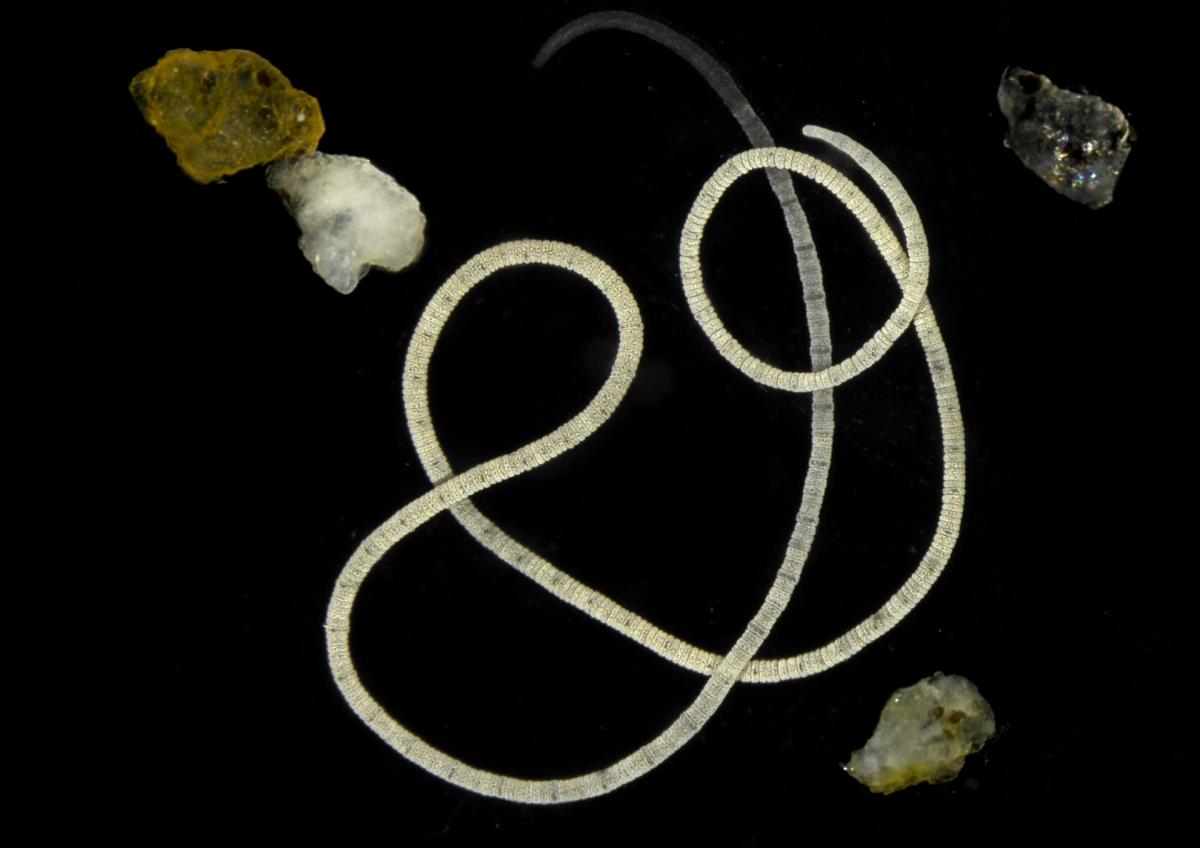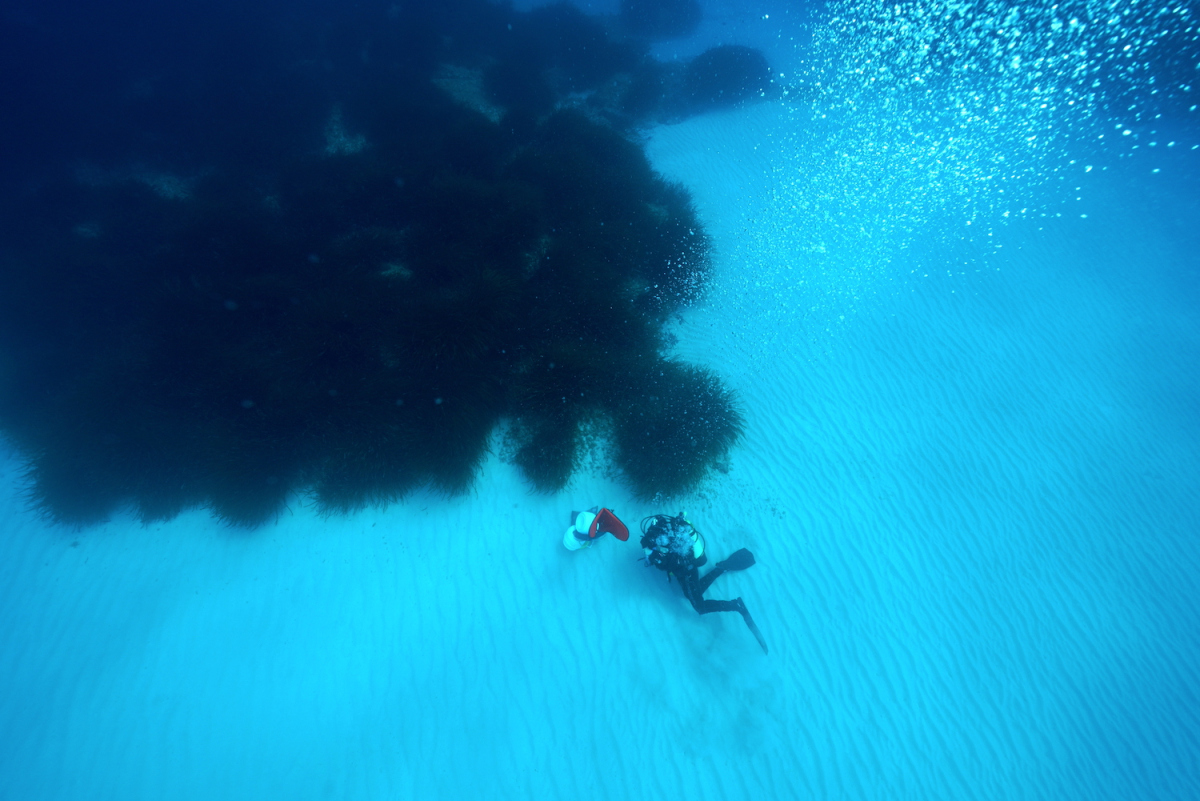- Press Office
- Press releases
- Gutless marine worms on a Mediterranean diet: Animals can synthesize phytosterols
Gutless marine worms on a Mediterranean diet: Animals can synthesize phytosterols
Cholesterol and phytosterol are sterols, fatty compounds essential for many biological processes such as the functioning of cell membranes. Up to now, it has been assumed that phytosterols are characteristic for plants, and cholesterol for animals, and that typically only plants can make phytosterols, while animals make cholesterol. Dolma Michellod, Nicole Dubilier and Manuel Liebeke from the Max Planck Institute for Marine Microbiology in Bremen, Germany, were therefore surprised when they discovered that a small marine worm called Olavius algarvensis, which lives in seagrass beds in the Mediterranean, has much more phytosterol than cholesterol. “We knew the worms couldn't be eating the seagrass because they do not have a mouth or gut,” explains first author Michellod. “We next wondered if the symbiotic bacteria inside Olavius, which provide them with their nutrition, might make phytosterols, but this wasn't the case” adds Dubilier. “We were also able to exclude that the worms were taking up phytosterols through their skin. It was only then that we realized that the worms must be making the phytosterols themselves” explains Liebeke.
The Max Planck researchers, together with colleagues from the MARUM – Center for Marine Environmental Sciences in Bremen, the University of Münster, the University of Hamburg, North Carolina State University and Imperial College London, used a wealth of methods that included sequencing of the worm's DNA and RNA, protein and metabolite analyses and imaging of sterols to reveal that it is the worm that makes the phytosterols, and that the main phytosterol they make is sitosterol. Their study is the first to show that a metazoan animal can synthesize phytosterols and was published in the journal Science on May 5th.
From worms to corals – five animal phyla have the genes for making phytosterols
Even more surprising for the researchers was their discovery that the gene needed to make sitosterol from precursors of cholesterol is widespread in the animal kingdom. “We discovered a gene that was thought to have been lost long ago in the evolution of animals,” explains Liebeke. Michellod adds: “It was exhilarating to discover this gene in so many different groups of animals, from corals and earthworms to clams and mussels". "This means there is a strong selective advantage for animals in having the gene that allows them to make phytosterols. We think phytosterols might make animal membranes more permeable, but so far, that's just wild speculation," adds Dubilier.
The Good, the Bad, and the Ugly: Understanding the role of cholesterol and phytosterols
So far, sterol research in animals has focused on cholesterol. Known for being “The Good, the Bad, and the Ugly”, some forms of cholesterol are essential for building cell membranes and producing hormones, while others are harmful and can block blood vessels, and increase the risk for cardiovascular diseases. A wealth of recent findings on the benefits of phytosterols for humans indicate that they may improve blood cholesterol levels, thereby reducing the risk of heart attacks or strokes. But the precise manner in which phytosterols provide benefits is far from understood. The researchers from the Max Planck Institute for Marine Microbiology are convinced that the tiny marine worm Olavius algarvensis is a valuable model organism for better understanding the beneficial role of plant sterols for animal health and well-being.
Original publication
Dolma Michellod, Tanja Bien, Daniel Birgel, Marlene Violette, Manuel Kleiner, Sarah Fearn, Caroline Zeidler, Harald R. Gruber-Vodicka, Nicole Dubilier, Manuel Liebeke (2023): De novo phytosterol synthesis in animals. Science (May 5, 2023)
Participating institutions
- Max Planck Institute for Marine Microbiology, Bremen, Germany
- MARUM – Center for Marine Environmental Sciences, University of Bremen, Germany
- University of Münster, Germany
- University of Hamburg, Germany
- Imperial College London, UK
- North Carolina State University, USA
Please direct your queries to:
Group leader
MPI for Marine Microbiology
Celsiusstr. 1
D-28359 Bremen
Germany
|
Room: |
3244 |
|
Phone: |

Director
MPI for Marine Microbiology
Celsiusstr. 1
D-28359 Bremen
Germany
|
Room: |
3241 |
|
Phone: |

Head of Press & Communications
MPI for Marine Microbiology
Celsiusstr. 1
D-28359 Bremen
Germany
|
Room: |
1345 |
|
Phone: |


